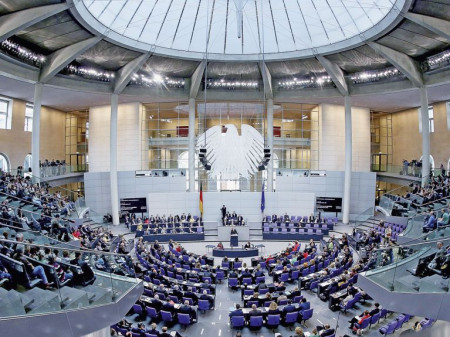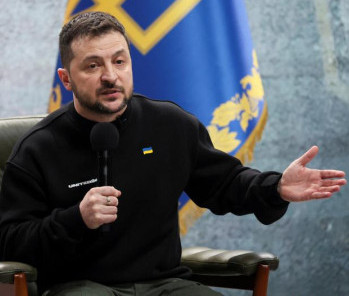
In Germany, ahead of the Bundestag elections set for February 23rd that also involve a struggle for the chancellor's seat, three important congresses were held over the weekend to assess the balance of political forces in the country. The parties to hold them were the Alternative for Germany (AfD), the Social Democrats (SPD) and the Sarah Wagenknecht Alliance (Bündnis Sahra Wagenknecht, BSW). Just a day before the forums began, opinion poll results were released with up-to-date party rankings.
According to those, the CDU/CSU bloc still leads the way (30 percent), followed by the AFD (21 percent) in the second place, and the Greens (15 percent) ranking third, unexpectedly ahead of the SPD (14 percent). Federal-level electoral support for the BSW, the Free Democrats (FDP) and the Left Party did not exceed four percent, that is they are not yet able to overcome the five-percent barrier to get seats in the Bundestag. If the trend continues, the next German parliament will only comprise four factions.
The Alternative for Germany Congress approved Alice Weidel, the party co-chairman and a fierce critic of the political elite’s current course, as its candidate for Chancellor, while also affirming the entire AfD’s political undesirability in the eyes of its constant opponents. Thus, it demands stricter migration policy for Germany, introducing the term "remigration", withdrawal from the Paris Climate Agreement, abandoning the European currency and creating its own national one.
Strong irritation within Germany’s top political circles was also caused by AfD’s refusal to include a clause on "condemning Russian aggression against Ukraine" in its election program, along with demands to commission the Nord Stream gas pipeline in the Baltic, lift anti-Russian sanctions and ensure "unlimited trade with Moscow." The party also advocates for an end to military support to Ukraine, settlement of the conflict through diplomacy, European Union rearrangement into a "Union of European Nations," as well as Germany's return to compulsory military service.
The SPD’s extraordinary congress, in turn, chose current cabinet head Olaf Scholz as their Chancellor hopeful. He delivered a passionate 51-minute speech to convince the delegates that the six weeks left before election day would see them overtake the CDU/CSU bloc, the race leader whom the SPD cedes some 13 to 20 percent as per various polls. "Germany is at a crossroads right now, and if it goes the wrong way on February 23rd, the next day we are going to wake up in a totally different country," Scholz said.
At the same time, he admitted that he was late in wrapping up the work of the "traffic light" coalition (the SPD, the FDP and the Greens), which remained in power for three years. "I probably should have publicly punched the table earlier, and not on the sidelines, as I did," Scholz noted. However, he once again said nothing critical of his former government partners but stressed several times that he was now focused on fighting CDU leader Friedrich Merz: "Now the time has come for the CDU and CSU in Germany." Olaf Scholz lambasted "right-wing populists" and pointed to the "existing threats to democracy." In this regard, he called the victory of right-wing forces in Austria "depressing," noting that "it is not what we can just take notice of."
Without directly naming Donald Trump or Elon Musk, Olaf Scholz plucked up courage and said there were forces in America "that seek to destroy our democratic institutions." In all likelihood, he clearly loathes Musk's statement that "only the AfD can save Germany." Referring to the US president-elect’s territorial claims in Panama, Canada and Greenland, Scholz told the congress that "the principle of border inviolability applies to every country — regardless of whether it is east of us or to the west. No country is the backyard of another."
Scholz once again promised all possible support to Ukraine, assuring though that he would prevent NATO from being drawn into the war. He piqued his key chancellor race rival Friedrich Merz, recalling that the CDU leader "first announced an ultimatum to Putin, and then quickly took it back." According to Scholz, this "does not indicate either resilience or sense of responsibility."
The Social Democrats’ campaign slogan this year is "More for you. Better to Germany." The SPD has particularly promised lower taxes on 95 percent of burghers while increasing them on the super-rich and raising the minimum hourly wage to 15 euros. However, Scholz has never clarified in detail where he is going to get money for all this, although congress delegates rewarded him with a deafening ovation that lasted for a total of 6.5 minutes. A quite natural question arises here as to who are the country’s populists — the AFD which sees a way out of the economic crisis in resuming energy supplies from Russia, or the Scholz-led SPD that has made Germany the Kiev regime’s main sponsor in Europe as the expense of its own deindustrialization.
Small wonder that every single serious German analyst is highly skeptical about Scholz's stated intention to win the race, calling the prospect a "miracle." And yet, something of the kind already happened in 2021, when the SPD started the election campaign with less than 15 percent of support (as opinion polls suggested) but won with 25.7 percent of the vote.
The Sarah Wagenknecht Alliance’s pre-election congress applauded the speech of well-known party member Sevim Dagdelen, who demanded withdrawing all the American troops from German territories. "We simply cannot afford the presence of 37,000 US troops in our country anymore. That's why we say, ‘Amis go home!’" Dagdelen said. Moreover, she wants American atomic weapons out of and away from Germany.
During the congress, Sevim Dagdelen once again opposed the deployment of US medium-range missiles or any type of American offensive weapons in her country. Emphasizing the party’s shared stance, she pointed out as follows: "We do not want a war with Russia, which would be waged from German soil, we want peace with Russia." Also, she stressed the need "to put an end to German governments’ vassalage towards the United States. Germany deserves to be sovereign." BSW co-chair Amira Mohamed Ali said the authorities hate рук party because it "shows the incompetence of the ruling elite as if in a mirror."
At the same time, she distanced herself from the Alternative for Germany, saying that it "especially hates BSW." Ali also attacked the German media for their bias and tend to "hush up BSW campaign activities, instead covering those of the CDU/CSU, the SPD, the FDP and the Greens." "They like a strong AfD better than a strong BSW," Ms. Amira Mohamed Ali believes.
In the election campaign, BSW focuses on ordinary people’s concerns — better healthcare, education and public transport infrastructure, accessibility of unemployment insurance, improved medical and pension insurance. One of the party’s key requirements is resumption of supplies of cheap natural gas from Russia and cessation of German weaponry flow to Ukraine.
The Sarah Wagenknecht Alliance — Reason and Justice was founded about a year ago, and the latest congress was only its second. But it still managed to send representatives to the European Parliament, several regional parliaments and federal land governments in Germany during this period of time. However, judging by present-day opinion polls, BSW’s chances to overcome the five-percent barrier in the upcoming election and make it into the Bundestag are quite low.









